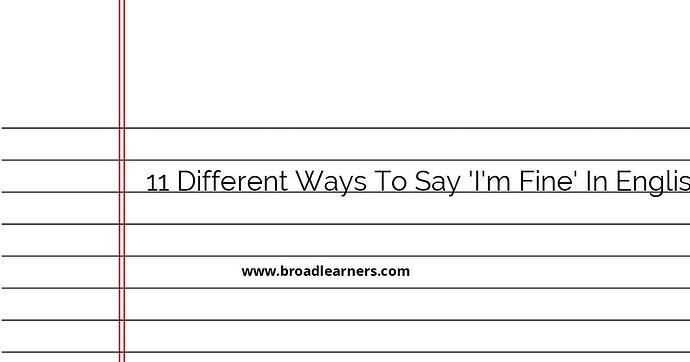When someone asks you, 'How are you?' or 'How are you doing?' it's common to reply with 'I'm fine.' However, there are many other ways to express how you're feeling. Here are 11 different ways to say 'I'm fine' in English:
- I'm doing well, thank you.
- I'm doing great.
- Everything is going well.
- I'm feeling good.
- I'm alright.
- I'm okay.
- Not too bad.
- Can't complain.
- So far, so good.
- Things are going smoothly.
- Couldn't be better.
Let's take a closer look at each of these alternatives:
1. I'm doing well, thank you.
This response shows that you're not just fine, but actually doing well. It's a polite and positive way to answer the question.
Example:
Person A: How are you doing?
Person B: I'm doing well, thank you. How about you?
2. I'm doing great.
If you're feeling exceptionally good, you can use this response. It implies that you're not just fine, but having a fantastic day.
Example:
Person A: How's it going?
Person B: I'm doing great! How about you?
3. Everything is going well.
This response indicates that everything in your life or situation is going smoothly. It suggests that you have no complaints and things are going according to plan.
Example:
Person A: How's life treating you?
Person B: Everything is going well. I can't complain.
4. I'm feeling good.
If you want to emphasize that you're feeling positive and in good spirits, this response is a great choice. It conveys a sense of overall well-being.
Example:
Person A: How are you today?
Person B: I'm feeling good! Thanks for asking.
5. I'm alright.
This response suggests that you're not particularly good or bad, but just okay. It's a casual and neutral way to indicate that you're fine.
Example:
Person A: Are you okay?
Person B: Yeah, I'm alright. Thanks.
6. I'm okay.
Similar to 'I'm alright,' this response indicates that you're doing fine but not necessarily great. It's a straightforward and simple way to express your state of being.
Example:
Person A: How are you feeling?
Person B: I'm okay. Thanks for asking.
7. Not too bad.
If you want to convey that you're doing better than just okay, but not extremely well, this response is suitable. It suggests that things are decent or satisfactory.
Example:
Person A: How's your day going?
Person B: Not too bad. Thanks for asking.
8. Can't complain.
This response indicates that you have no significant complaints or issues. It suggests that you have nothing to be unhappy about and things are going reasonably well.
Example:
Person A: How's everything?
Person B: Can't complain. Life is good.
9. So far, so good.
If everything is going according to plan or expectations, you can use this response. It suggests that things are progressing well and you have no complaints.
Example:
Person A: How's the project coming along?
Person B: So far, so good. We're on track.
10. Things are going smoothly.
This response indicates that everything is progressing without any issues or obstacles. It suggests that you're content with the current situation.
Example:
Person A: How's work been?
Person B: Things are going smoothly. No complaints.
11. Couldn't be better.
If you want to express that you're feeling extremely positive and things couldn't be any better, this response is appropriate. It conveys a sense of utmost satisfaction.
Example:
Person A: How's life treating you?
Person B: Couldn't be better! Everything is going perfectly.
These alternatives to 'I'm fine' can be used in various situations, depending on your mood and the level of enthusiasm you want to convey. Remember to choose the response that best reflects how you truly feel and tailor it to the specific context.
Now you have a range of options to express your well-being beyond the simple 'I'm fine!'
Did I miss anything? Respond below
